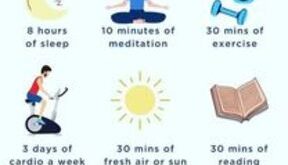Sleep and Stress: Unlocking the Keys to Better Health
Sleep and stress are intricately connected, each influencing the other in significant ways. Poor sleep can lead to increased stress, while chronic stress often disrupts sleep patterns. Achieving a balance between proper rest and managing stress is crucial for overall well-being. Let’s explore how these two factors impact health and how you can improve both for a healthier life.
1. The Impact of Stress on Sleep
Stress is the body’s natural response to challenging or threatening situations, triggering the “fight or flight” response. When stress becomes chronic, it can severely disrupt sleep quality and duration. Here’s how stress affects your sleep:
- Difficulty Falling Asleep: High levels of stress activate the body’s alert system, increasing heart rate and keeping the mind racing, making it difficult to relax and fall asleep.
- Frequent Awakenings: Stress often causes fragmented sleep, leading to multiple awakenings throughout the night. This disrupts the sleep cycle and reduces the time spent in deep, restorative sleep stages.
- Shortened Sleep Duration: People under stress may struggle with insomnia or wake up earlier than needed, leaving them feeling unrested and fatigued.
2. The Effects of Poor Sleep on Stress Levels
Lack of sleep can intensify stress, creating a vicious cycle. When you don’t get enough rest, your body is less equipped to handle stressors, leading to heightened emotional responses. Here’s how insufficient sleep exacerbates stress:
- Emotional Instability: Sleep deprivation reduces your brain’s ability to regulate emotions, making you more prone to anxiety, irritability, and mood swings.
- Reduced Cognitive Function: Without enough sleep, your concentration, decision-making, and problem-solving abilities decline, increasing feelings of overwhelm and stress.
- Increased Cortisol Levels: Sleep deprivation raises cortisol, the body’s primary stress hormone, further amplifying stress and its negative effects on the body.
3. The Health Risks of Poor Sleep and Chronic Stress
Both sleep deprivation and chronic stress can lead to a range of health problems:
- Weakened Immune System: Poor sleep and high stress suppress immune function, making you more vulnerable to infections and illnesses.
- Heart Health Risks: Chronic stress and sleep deprivation increase the risk of hypertension, heart disease, and stroke by raising blood pressure and causing inflammation.
- Mental Health Issues: Long-term stress and sleep loss contribute to the development of anxiety disorders, depression, and other mental health conditions.
- Weight Gain: Stress triggers the release of cortisol, which can increase cravings for unhealthy foods and lead to weight gain. Poor sleep also disrupts the hormones that regulate hunger, promoting overeating.
4. Strategies for Better Sleep and Stress Management
Improving sleep and managing stress go hand in hand. Here are some effective strategies to promote restful sleep and reduce stress:
a. Establish a Consistent Sleep Routine
- Set a Regular Bedtime: Going to bed and waking up at the same time each day helps regulate your internal clock, making it easier to fall asleep and wake up refreshed.
- Create a Relaxing Pre-Sleep Routine: Engage in calming activities before bed, such as reading, meditating, or listening to soothing music, to signal to your body that it’s time to wind down.
b. Create a Sleep-Friendly Environment
- Optimize Your Bedroom: Keep your room cool, dark, and quiet to create the ideal sleep environment. Blackout curtains, earplugs, or a white noise machine can help block out distractions.
- Limit Screen Time: Exposure to blue light from phones, tablets, and computers can interfere with melatonin production, the hormone that regulates sleep. Avoid screens for at least an hour before bed.
c. Practice Stress-Reducing Techniques
- Mindfulness Meditation: Mindfulness helps calm racing thoughts and reduces anxiety, promoting better sleep. Even just 10 minutes of meditation before bed can help.
- Deep Breathing Exercises: Slow, deep breathing stimulates the parasympathetic nervous system, promoting relaxation and reducing stress. Try techniques like the 4-7-8 breathing method to calm your mind.
- Exercise Regularly: Physical activity reduces stress hormones like cortisol and increases the production of endorphins, which improve mood and sleep. Aim for at least 30 minutes of moderate exercise daily, but avoid vigorous exercise close to bedtime.
d. Manage Stress During the Day
- Prioritize Tasks: Organize and prioritize your daily tasks to reduce feelings of overwhelm. Breaking large tasks into smaller, manageable steps can make them less stressful.
- Take Breaks: Regular breaks during the day, even if they’re short, help lower stress levels. Stretching, walking, or practicing mindfulness can help you reset and return to tasks with a clearer mind.
- Maintain Social Connections: Positive social interactions can buffer stress. Spending time with family and friends or participating in group activities provides emotional support and relaxation.
5. Sleep Hygiene Tips for Lasting Improvements
To improve your sleep quality and minimize the effects of stress, it’s important to practice good sleep hygiene:
- Avoid Caffeine and Heavy Meals Before Bed: Caffeine and large, heavy meals can interfere with your ability to fall asleep, so try to limit their intake in the evening.
- Limit Alcohol and Nicotine: Both substances can disrupt your sleep cycle, leading to fragmented and poor-quality sleep.
- Keep Naps Short: If you nap during the day, limit it to 20-30 minutes to avoid interfering with your nighttime sleep.
Conclusion
Sleep and stress are deeply interconnected, each affecting the other and your overall health. Poor sleep can heighten stress, and chronic stress can wreak havoc on your sleep patterns, leading to a cycle of physical and mental health problems. By prioritizing both restful sleep and effective stress management techniques, you can break the cycle and unlock the keys to better health. Small changes, such as practicing mindfulness, creating a sleep-friendly environment, and maintaining a consistent sleep routine, can significantly improve your quality of life.
 Blooket Join Blooket Join
Blooket Join Blooket Join





